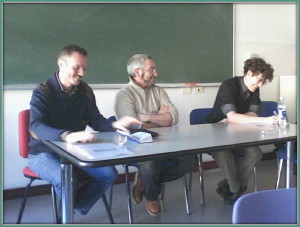Intersex/dsd: medicalizzazione e soggettivazione politica
![]()
Il Centro di ricerca Politesse, Politiche e Teorie della SessualitĂ ,Â
organizza il seminario su
Intersex/dsd: medicalizzazione e soggettivazione politica
presso il dipartimento di Filosofia, Pedagogia e Psicologia dell’UniversitĂ di Verona
Venerdì 14 febbraio 2014 ore 14.30-17.30
Aula 1.5 Palazzo di Lettere, via San Francesco 22, primo piano
Programma:
14.30-15.10: Elisa A.G. Arfini, ricercatrice precaria in Sociologia, UniversitĂ di Bologna: Movimenti intersex e gruppi di pazienti con dsd
15.10-15.40: Alessandro Comeni, attivista intersex, collettivo intersexioni, Firenze: Perché dirsi intersex?
15.40-17.30: dibattitoÂ
Si consiglia la lettura di:
Elisa A.G. Arfini, Scientificamente provato? Controversie biopolitiche nel trattamento dell’iperplasia surrenale congenita, in «Tecnoscienze. Italian Journal of Science and Technology Studies», Vol. 3, n. 2, 2012, pp. 61-94 (http://www.tecnoscienza.net/index.php/tsj/article/view/114/77);
e la consultazione dell’archivio intersex sul sito del collettivo intersexioni.Â
 
Intersex/DSD: medicalization and political subjectivation
The first part of the seminar was focused on a critique of the abuse of intersex issue as retorical device to explain the social construction of gender. This topos, frequently used by social sciences and particularly by gender studies, disregards that intersex people are real, not a mythological creatures. The “intersex movement” involves different social actors: scientists, patients and their families, advisors but also people who don’t recognise themselves as patient. This movement can be reasonably associate to the social health movement: the biosociality is one of the most important source of empowerment for the intersex people. The second part of the seminar was dedicated to describe the bringing out of an “intersex subjectivity”, starting from the direct experience of an italian intersex activist. In his presentation, he stressed immediatly how the intersex politics is, still today, hardly influenced by pathologization and medicalization undermining the possibility of an intersex awareness or identification. Instead, the first DSD italian advocacy groups was founded by family members of patients with the goal to limit the invasive nature of the medicalization: nowadays the intersex people are too often only guinea-pig for the biomedicine and for the pharmaceutical companies. Closing the seminar, the debate stressed the need to build new form of coalition among the different subjectivities that compose the intersex movement, trough a deep work of information, education and narration.
Â






